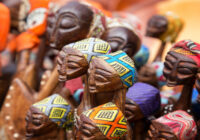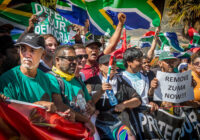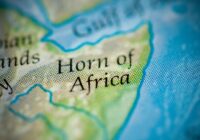Should the DRC slip back into the kind of conflict that characterized the previous war, the intervening years of peace will become nothing more than a footnote in a bloody history.
For years now, we’ve been seeing headlines about violence and unrest in the Democratic Republic of Congo. But a surge in violence over the past several weeks suggests that this time things are different. New flare-ups of fighting across this conflict-riven state is having a profound impact on its people, with thousands of Congolese forced to flee their homes each day to seek asylum in neighboring states. It’s estimated that 1.7 million people have been affected in the past 12 months alone, making the DRC one of the countries hardest-hit by conflict displacement in the world today.
Theories about the root causes of the conflict differ, but with much of the unrest due to the intransigence of DRC’s controversial president, Joseph Kabila, little progress is likely. Will the UN’s declaration that the situation is nearing “breaking point” help to change the narrative, or are we looking at the run-up to the next “African World War”?
With each passing week the DRC death toll rises. Recent reports claim that a total of 49 people were killed in Ituri province, during an outbreak of ethnic violence that was attributed to continuing unrest between the region’s Hema and Lendu communities. The clash happened north of the country’s capital, in Bunia, and is the latest episode in a battle that has already claimed 100 lives and caused 200,000 to leave their homes.
Unrest isn’t confined to Ituri territories, however. Armed groups, including the Hutu extremist group FDLR (Democratic Forces for the Liberation of Rwanda), is creating chaos between rival tribal communities in North Kivu’s Rutshuru territory, as well as in the province of South Kivu, while conflict has also erupted in the country’s central Kasai region following the assassination of an anti-Kabila tribal chieftain in September 2016. In Eastern DRC, where land and mineral resources have been sparking conflict for decades and millions have died since the late 1990s, dozens of militia groups are still in operation.
The impact of the grinding violence is being felt not only within the DRC, but also touches the countries it borders — including Uganda, Rwanda, Burundi and Angola — many of which are ill-equipped to cope with the mass influx of refugees. While thousands of those displaced head for remote regions of the DRC that are currently inaccessible to aid organizations, many thousands more are opting to cross Lake Albert to Uganda, where unsanitary living conditions await. The UN believes that as many as 10 million Congolese need humanitarian aid, half of whom are suffering as a result of displacement.
The unrest is being fueled in large part by the refusal of President Kabila to step down, despite having reached the end of his second — and ostensibly last — term in office in December 2016. Opposition parties gained the president’s agreement to hold elections at the end of 2017, but campaigning has been put on hold again after the Congolese electoral commission, CENI, ruled that voting couldn’t take place due to ongoing violence in the Kasai region.
To date, the DRC has never experienced a peaceful transition of power. The conflict that was initiated by the overthrow of long-standing leader Mobuto Sese Seko in 1997 led to a brutal six-year war — nicknamed Africa’s World War — in which nine countries battled on Congolese soil, resulting in almost 6 million deaths and the displacement of millions more.
Presidential hopeful Moïse Katumbi is the favorite to succeed Kabila and may yet bring stability back to the country, although his electoral ambitions have been stymied by politically motivated legal charges against him. He left the Congo in May 2016, after state prosecutors accused him of hiring mercenaries, and has since been living in exile in Belgium. This week, however, he announced a new opposition coalition — Ensemble pour le changement, or Together for Change – and promised that he would return to the DRC by June to officially file his candidacy for presidential elections slated for December.
Failure to hold the long-delayed elections in December would only further plunge the DRC into the abyss, considering the deep fissures and political instability that are stoking the current conflict.
It is a situation that’s not confined solely to the DRC. Long-term conflicts are also simmering in countries such as Somalia, Libya and Mali, while the four-year civil war in South Sudan is deepening. Rather than pitting country against country, battle lines in these disputes are increasingly drawn along caste, clan or ethnic boundaries, even dividing speakers of different dialects in some cases.
Should the DRC slip back into the kind of conflict that characterized the previous war, the intervening years of peace will become nothing more than a footnote in a bloody history. There may be little appetite for war among neighboring countries, but as rebel incursions are met with a ruthless government response, deaths are already mounting — if not from acts of violence, then from the spread of diseases such as cholera through increasingly vulnerable populations.
There is still hope that the elections planned for the end of the year may yet take place and that further bloodshed can be avoided. By acting in the interests of the nation, Kabila’s government could prevent the DRC from sliding into a full-blown war that would decimate its population, draw its neighbors into the maelstrom and set progress back by decades.
The views expressed in this article are the author’s own and do not necessarily reflect Fair Observer’s editorial policy.
Photo Credit: The Hornbills Studio / Shutterstock.com
Support Fair Observer
We rely on your support for our independence, diversity and quality.
For more than 10 years, Fair Observer has been free, fair and independent. No billionaire owns us, no advertisers control us. We are a reader-supported nonprofit. Unlike many other publications, we keep our content free for readers regardless of where they live or whether they can afford to pay. We have no paywalls and no ads.
In the post-truth era of fake news, echo chambers and filter bubbles, we publish a plurality of perspectives from around the world. Anyone can publish with us, but everyone goes through a rigorous editorial process. So, you get fact-checked, well-reasoned content instead of noise.
We publish 2,500+ voices from 90+ countries. We also conduct education and training programs
on subjects ranging from digital media and journalism to writing and critical thinking. This
doesn’t come cheap. Servers, editors, trainers and web developers cost
money.
Please consider supporting us on a regular basis as a recurring donor or a
sustaining member.
Will you support FO’s journalism?
We rely on your support for our independence, diversity and quality.







